A CRYSTAL QUINTET
Five Instrumental Anthology Discs from Crystal Records Inc.
Each includes a work by ALAN HOVHANESS
The unifying thread in these five discs is the music of Alan Hovhaness.
Peter Christ, the guiding light of Crystal, has built up an enviable catalogue
over the years - a substantial portion of it centred on 'calling-card'
anthologies for individual virtuoso artists.
Duo 1 POINT 5
 BILL PERCONTI (alto
saxophone)
BILL PERCONTI (alto
saxophone)
 CRYSTAL RECORDS
CD653 61.58
CRYSTAL RECORDS
CD653 61.58
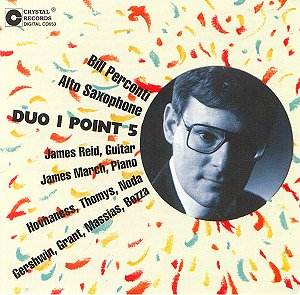
Perconti is recorded intimately in this varied selection. The light clatter
of keys is the downside of such close proximity. Alojzy Thomys's Ten
Miniatures (20.17) are acceptably varied and entertaining in a fashion
which approximates to Milhaud. The Hovhaness Suite Op.291 (8.16) is
for sax with guitar. It dates from 1976 and is a reflective monody evocative
of the green and tragic miles of Armenia. The guitar lends a Japanese air
- counterpart to the composer's orchestral piece Mountains And Rivers
Without End. Ryo Noda's Improvisation III is avant-garde and pretty
unforgiving. Gerard Massias's Suite Monodique is tight and spry, lyric
and alert though overall tending towards dryness. Jerome Grant's Duo 1
point 5 for sax and tape is rather romantic betraying his work as a Hollywood
composer though this comes as balm after the restraint of the Massias and
Noda. Bozza's Improvisation (aimless) and Caprice ('flight
of the saxophone') is followed by two Gershwin efforts. Three Quarter
Blues is a drooping soliloquy with a subtle smile while Promenade is
cheekily coaxed along. Both are arranged by Bill Perconti who is a most
accomplished and sensitive artist hindered by the mechanical dimension of
his key-clicking instrument.
Reviewer
Rob
Barnett

BRASS BONANZA
 eight American brass
quintets
eight American brass
quintets
 CRYSTAL CD200 62.25
CRYSTAL CD200 62.25
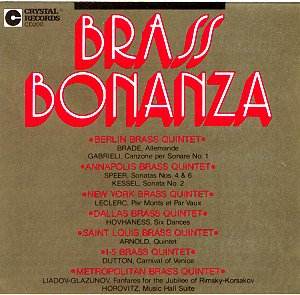
This anthology was assembled from Crystal's extensive back catalogue. The
Metropolitan Quintet treat us to early seventeenth century courtliness from
Gabrieli and William Brade. From this it is a small step to the later brilliance
of two Speer and one Kessel sonatas played by the Annapolis Quintet. Michel
Leclerc, a Belgian composer (b.1914) produces a Stravinskian gambol over
five brief fences some acidically modern - as in the case of the second.
These are played by the New York Brass quintet who seem to relish the Petrushka
frolics of the first and final movements of the five section suite for five
instruments. The 1-5 Brass Quintet are soupily sentimental in Northern British
style in the Brent Dutton Carnival of Venice. Joseph Horovitz, now
with a disc to himself on ASV, has had his Music Hall Suite (1964)
recorded before but this is pretty good if a bit too languid in Soubrette
Song. It is played by the Metropolitan Quintet. The Saint Louis players
do the extremely well kent Malcolm Arnold quintet and are aided by a distant
though rich recording. This performance has slickness, humour and virtuosity
aplenty and bids fair to be a first choice - a lovely performance. The Dallas
Quintet give us Hovhaness's Six Dances each in a different metre:
13/8, 5/8, 3/4, 7/8, 5/8 and 2/2. Anyone at all accustomed to his brass writing
from the symphonies will recognise the composer instantly although the second
movement would certainly have foxed me. The movements are predominantly
meditative lightened at the end by the renaissance dancing of the allegro
brillant. The disc kicks off with two brief but worthwhile celebratory
fanfares by Glazunov and Liadov.
Reviewer
Rob Barnett

PISTONS AND PIPES
 Richard Giangiulio (trumpet)
Paul Riedo (organ)
Richard Giangiulio (trumpet)
Paul Riedo (organ)
 CRYSTAL RECORDS
CD666 67.14
CRYSTAL RECORDS
CD666 67.14
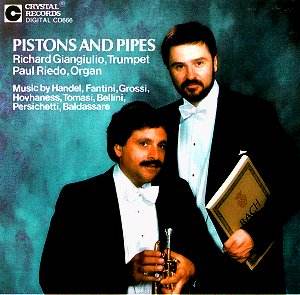
The Handel Suite In D Major is bluffly regal and is carried off by both artists
in fine style. Andrea Grossi's 1680s Sonata Decima is also rather
Handelian. The three Fantini sonatas belie their 17th century
origins in dignified smooth hymnal style surprisingly close to Hovhaness.
Pietro Baldassare's Sonata in F is in the manner of Corelli. They seem to
date from the early 18th century. Vincent Persichetti (1915-1987) brings
us to the twentieth century - to be exact, to 1948. The Hollow Men
(after T S Eliot's poem) is rounded and not too remote from Copland at
one extreme and tugged towards Roy Harris at the other. Its stony lyricism
is most compelling and I was glad to encounter the work here. Will someone
now gives us some of the symphonies. Do we have any Persichetti experts out
there who could recommend some priorities for recording? Henri Tomasi's
Variations Gregoriennes is from 1964 and is also available in a version
with strings. It is a work of fibre and emotional moment with moods sincere
and varied, poised and tragic. Tomasi is a composer well worth your attention
as you will know if you have explored the Marco Polo disc of his choral music.
The disc concludes with the well-rounded bel canto of Bellini's early
Concerto in E flat. The Hovhaness Sonata for trumpet and organ (1948) dates
from pretty much the same time as the Symphony St Vartan and I hear
echoes of that work through its plangently fruity three movements. Hovhaness
aims for the spirituality one finds in Vaughan Williams - say in his Tallis
Fantasia - and largely achieves it in the first of three movements all entitled
Senza Misura. The middle and final movements are grimmer in the organ
part than I am accustomed to from Hovhaness but in the trumpet role there
is that mesmerising contemplative droop and downward slew. All in all this
is a most impressive disc brilliantly played by both artists - indeed either
could have been billed first. The disc is well filled.
Reviewer
Rob Barnett

AMERICAN MUSIC FOR VIOLA
 Paul Cortese (viola) Jon Klibonoff
(piano)
Paul Cortese (viola) Jon Klibonoff
(piano)
 CRYSTAL RECORDS CD636
63.22
CRYSTAL RECORDS CD636
63.22
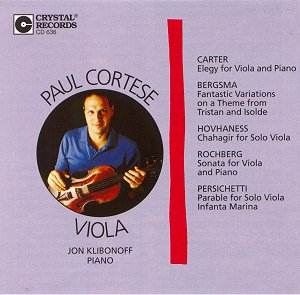
Elliott Carter's Elegy (1943) is in his early romantic style so think
in terms of the style he adopted for his symphony and Pocahontas.
This is a calm lyrical work - not in the least 'difficult'. I would be interested
to hear this work in its versions for string quartet or string orchestra.
A lovely piece - quite a discovery! William Bergsma's Fantastic Variations
on a Theme from Tristan are pretty tough and turbulent. There is little
soft here and much that is troubled - a major change of gear from the Carter.
Hovhaness's brief Chahagir (it means 'Torch Bearer') is from 1945
and is based, as are his three Armenian Rhapsodies, on Armenian folk
tunes closer to the modality of Vaughan Williams' Flos Campi - also
for viola but with string orchestra and chorus. George Rochberg's three movement
Viola Sonata was premiered by Joseph de Pasquale with Vladimir Sokoloff.
It is a work of Rochberg's romantic phase. Unlike Carter, Rochberg discovered
lyricism and rejected atonalism in his later years. This work is grainy but
is strongly lyric in impulse and expression. It might well have been influenced
by Prokofiev. The dark song of the middle movement is positively Baxian while
the finale leans gently towards Shostakovich. Lastly two piece by Persichetti:
his Parable for solo viola and Infanta Marina for viola with
piano. The Parable (No. 16 in his sequence of Parables) is
from 1974 and is touched with a more avant-garde sour style fused with
Persichetti's innate warm humanity. The Infanta Marina (1960) is a
much more frankly lyrical piece but is positively restrained by the side
of the Rochberg and Carter. A disc of welcome discoveries. Bravo Crystal!
Reviewer
Rob Barnett

THE MAKING OF A MEDIUM
The Piano Trio - Mozart, Hovhaness, Frescobaldi,
Pasatieri, Bartok
 The Verdehr Trio
The Verdehr Trio
 CRYSTAL CD741 70.33
CRYSTAL CD741 70.33
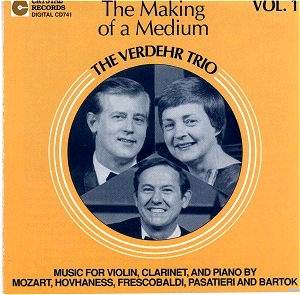
The Verdehr have teamed with Crystal to make a series of discs featuring
the trio in various permutations. This CD, the first in the series, features
a typical clarinet trio. The Mozart (K381) is the Verdehr's own skilful
arrangement of a piano duo - rather dour in the busy first and final movements
but authentically dulcet in the second. The Frescobaldi switches harpsichord
and piano as is consistent with the early 17th century origin. The Canzone
seconda and Quinta have a certain slender sweetness. Thomas Pasatieri
(b. 1945 New York City) wrote Theatrepieces (3 movements) for the
Verdehr in 1986. Pasatieri is the latest in a long line of lyric American
Italians: Creston, Menotti, Giannini. The trio is in three movements and
one can certainly pick up his operatic credentials (he has written 17!) from
the singable lines in a bed of Rachmaninovian sentiment, some slavonic and
even English (Finzi!) angst. The whole work is romantically inclined but
with enough peppery emotion to avoid blandness. The Bartók Contrasts
is a Benny Goodman commission from 1938-40. Its atmosphere is one of
fret and worry and although there are some moments of relaxation (notable
in the gypsy riffs and ruffles of the Sebes finale) it is still a
comparatively sturdy piece of resilient modernism. Hovhaness's 1989 Lake
Samish is a characteristic (for Hovhaness!) five movement trio with each
movement in contrast. The slashing and stabbing of the persistent allegro
contrasts with the celestial hymns of the first and third movements using
a hymn to a tune whose outline English ears associate with the sung words
'all glory, laud and honour to thee redeemer King'. The latter part of the
third andante maestoso is a sinuous drugged snake dance. Celestial
stars glitter in the adagio misterioso which gives way to the becalmed
dripping waters of the final Jhala movement which in turn resolves
into a fast flickering dance. A fine selection and a recommendable disc.
Reviewer
Rob Barnett

